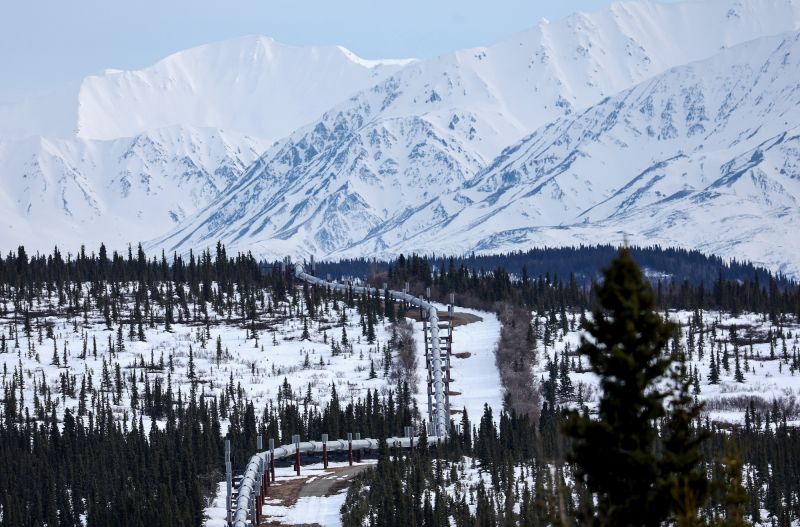In a sweeping win for climate and environmental advocates, the Biden administration on Friday finalized a rule to ban fossil fuel drilling on nearly half of the National Petroleum Reserve in Alaska, alongside other major conservation actions.
The Interior Department will block oil drilling on over 13 million acres in the Western Arctic, including about 40% of the land of the NPR-A – a remote area that is home to protected animal species including polar bears and caribou.
The reserve is more than 23 million acres of public land and an underground emergency oil supply for the US Navy that was designated in the early 1920s. More recently, it’s become the site of the ConocoPhillips-owned Willow project, a controversial oil drilling venture in the Arctic.
When the Biden administration approved Willow in March 2023, it sparked intense backlash among young people on social media, as well as environmental and climate groups. Friday’s action could improve President Joe Biden’s approval among young voters.
“These natural wonders demand our protection,” Biden said in a statement. Biden said he was “proud” of his administration’s move to conserve more than 13 million acres in the Western Arctic, but added, “as the climate crisis imperils communities across the country, more must be done.”
Some Alaska Natives are critical of the drilling ban across such a significant swath of the NPR-A. It has proved controversial with Alaska’s bipartisan congressional delegation, as well as Alaska Native groups who say they depend on the tax revenue from oil drilling to fund schools and basic services.
The final rule “does not reflect our communities’ wishes,” said Voice of the Arctic Iñupiat President Nagruk Harcharek, adding the move “will hurt the very residents the federal government purports to help by rolling back years of progress, impoverishing our communities, and imperiling our Iñupiaq culture.”
In addition to protecting a vast amount of the NPR-A on Friday, the Biden administration moved to block the Trump administration-approved Ambler road in the Alaskan wilderness. If built, the road would serve as the access point for a proposed copper mine. The administration signaled it wanted to take “no action” on the mine, effectively blocking the road’s access to federal land.
In a statement, Ambler Metals, the company seeking to mine copper in the region, said it was “deeply disappointed” in Interior’s decision. Ambler’s managing director Kaleb Froehlich said the move would deprive local communities of jobs and tax revenue and prevent the US “from developing a domestic supply of minerals that are critical for clean energy technology and national security.”
The Alaska announcements cap off a week that saw a flurry of actions from Biden’s Interior Department. On Thursday, the department announced a new rule that elevated conservation to put it on equal footing as other public land uses like grazing, mining and other energy development. The new conservation rule covers 245 million acres largely in the Western United States – about a tenth of the land in the nation.
Interior Sec. Deb Haaland said the administration’s Alaska conservation announcements “underscore our commitment to ensure that places too special to develop remain intact for the communities and species that rely on them.”
In a statement, Haaland added the move would be big step to safeguard “the way of life for the Indigenous people who have called this special place home since time immemorial.”
Environmental groups and some indigenous groups applauded Biden’s announcements on Alaska conservation as an “important step.”
“It’s no secret that the Reserve – a vast region of tundra and wetlands teeming with wildlife – has frequently landed in the crosshairs of the insatiable fossil fuel industry,” said Earthjustice attorney Jeremy Lieb in a statement. “We applaud this move and call for even bolder action to keep the fossil fuel industry out of the Arctic, for the sake of the climate and future generations.”
Rosemary Ahtuangaruak, the former mayor of the North Slope village of Nuiqsut, and a staunch opponent of Willow, called upon the Biden administration to build on the protections in a statement, saying it would help Alaska Natives “continue to sustain and pass along the traditions and activities of our elders for years to come.”
This story has been updated with additional information.



























